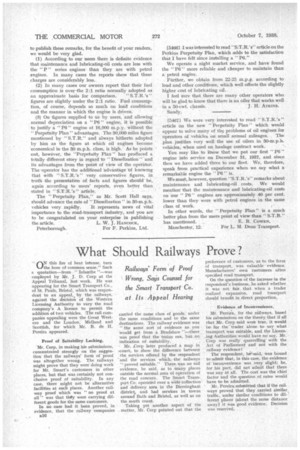What Should Railways Prove ?
Page 50

If you've noticed an error in this article please click here to report it so we can fix it.
Railways' Form of Proof Wrong, Says Counsel for the Smart Transport Co. at Its Appeal Hearing
ON this fire of heat intense, turn the hose of common sense." Such a quotation—from " Iolanthe "—was employed by Mr. J. D. Corp at the Appeal Tribunal, last week. He was appearing for the Smart Transport Co., of St. Pauls, Bristol, which was respondent to an appeal,. by the railways. against the decision of the Western Licensing Authority to vary the road company's A licence to permit the addition of two vehicles. The rail companies appealing were the Great Western and the London, Midland and Scottish, for which Mr. B. de H. Pereira appeared.
Proof of Suitability Lacking.
Mr. Corp, in making his submissions, concentrated strongly on the suggestion that the railways' form of proof was altogether wrong. The railways might prove that they were doing work for Mr. Smart's customers in other places, but that was certainly not conclusive proof of suitability. In any case, there might not be alternative facilities at such places. Another railway proof which was "no proof at all ' was that thtiy were carrying different goods for the same customers.
In no case had it been proved, in evidence, that the railway companies BIB
carried the same class of goods, under the same conditions and to the same destinations. The railway evidence was " the same sort of evidence as you would get from a Bradshaw "—there was proof that the trains ran, but no,
indication of suitability. .
Mr. .Corp later produced a map in -court, to show the difference between the services offered by the respondent 'and the services which, the railways " proved suitable." There. was no rail evidence, he said, as to many places outside the normal area of operation of the road concern. The Smart Transport Co. operated over a wide collection and -delivery area in the Birmingham district and had services in towns around Bath and Bristol, as well as on the south coast.
Taking yet another aspect of the matter, Mr. Corp pointed out that the preference of customers, as to the form of transport, was valuable evidence. Manufacturers' awn customers often specified road transport.
On the question of the increase in the respondent's business, he asked whether it was not fair that when a trader realized expansion, road transport should benefit in direct proportion.
Evidence of Inconvenience.
Mr. Pereira,. for the railways, based his submissions on the theory that if all that Mr. Corp said were true, it would be for the trader alone to say what transport was suitable, and the Licensing Authorities would have no say. Mr. Corp was really quarrelling with the Act of Parliament and not with the railway evidence!
The respondent, he..said, was bound to admit that, in this case, the evidence of inconvenience was very slight; he, for his part, did not.admit that there was any at all. The cost was the chief factor and the question of rates would have to be admitted.
Mr. Pereira submitted that if the railways proved that they carried similar traffic, under similar conditions to different places (about the same distance away) it was good evidence. Decision was reserved.




















































































